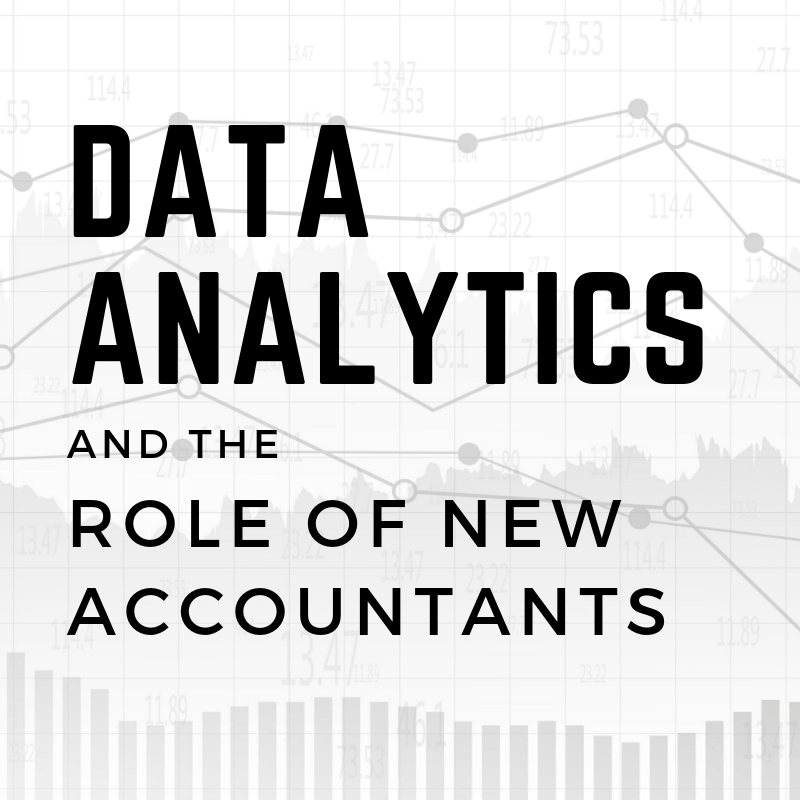Today’s accounting firms are facing a business environment that is both demanding and fluctuating due to productivity optimization available through newer accounting technologies. Accounting technologies are becoming more automated and the role of the new accountant is shifting into that of a business advisor, which requires new skill-sets. This includes professional skepticism, judgement, and critical thinking skills. And, with big data driving the business world, accounting firms are quickly aligning with market demand to incorporate data analytics into their own business models. This shift in accounting technology requires new accountants to also have stronger analytical skills in order to remain competitive in the accounting job market.
According to the Journal of Accountancy’s article, “The Next Frontier in Data Analytics:” In an increasingly data-driven world, CPAs need to be able to adapt to these technological disruptions.
Furthermore:
CPAs now often find themselves performing tasks that require skills in data analytics:
- Both internal and external auditors are using data analytics to enable practices such as continuous monitoring, continuous auditing, and analysis of full data sets in situations where only samples were audited.
- Financial planning and analysis professionals analyze data in hopes of discovering the best course of action for their companies.
- CFOs and finance leaders use Big Data to find patterns in customer behavior and market trends to drive company strategy.
Start your 7-day free trial today
Sometimes all it takes is just getting started. Experience the Roger CPA Review difference for FREE!!
How does data analytics affect the new accountant’s role?
Accountants already work with data and data analytic outputs to assess business performance within the framework of accounting principles and methods. They also use it to identify trends and unusual items requiring further investigation. However, the new accountant’s responsibility is to expand upon these responsibilities and take them a step further. Their ability to understand, process, interpret, and provide insight into these data outsources will play a vital role for both their clients’ and firms’ success.
To better understand the skill development in data analytics for new accountants, the Journal of Accountancy divided data analytics into four types:

While defining the 4 types of data analytics, the Journal of Accountancy additionally describes how:
Data analytics is often misunderstood as descriptive analysis (“what is”) only. The real value, however, lies in predictive (“what will be”) and prescriptive analysis (“What should we do?”). Data analytics is highly relevant as companies and industries transform to take advantage of technological innovations, and as expectations of regulators and investors with regard to data availability and analysis are increasing.
What types of skills will new accountants need to stay competitive in a data-driven world?
Roshan Ramlukan, EY Partner of Global Accounts, believes that the ideal new accountant should have the following skills:
- Good technical skills: Understands the data and knows how to manipulate it.
- Understanding of the business context: Can distill a business problem or opportunity into key questions to be answered and understands the business data flow and the relationship between objects within the business context.
- Analytical mindset: Possesses an inquiring nature and intellectual curiosity.
Accountants will need to develop these and other new skills that focus on the ability to use data analytics outputs to draw conclusions and produce meaningful insights.
How can new accounting graduates adequately prepare to meet the demands of the current job market?
Understanding the new role of the accountant and how data analytics aligns with that role is at the forefront of accounting education. Educational institutes will need to respond to the evolving role of new accountants by providing an educational system that supports market expectations. It’s important for accounting educators to align, adapt and respond to advances in technology so their accounting graduates are competitive in the accounting job market.
Accounting educators have the opportunity to bring real world resources into their classrooms and in their curriculum. Accounting firms provide supplemental lessons and related classroom tools and solutions to professors that can be adopted into their coursework. These supplemental materials mirror what students can expect when they enter the accounting profession. This type of hands-on learning resonates greatly with accounting graduates while allowing them practical and applied experience with today’s accounting technologies.
There is no pause on the influx of big data and data analytics into the accounting profession. Accounting educators will need to embrace the changing landscape of accounting technology and adapt to effectively prepare their accounting students for their future careers.
Sources:
https://www.journalofaccountancy.com/issues/2016/aug/data-analytics-skills.html
